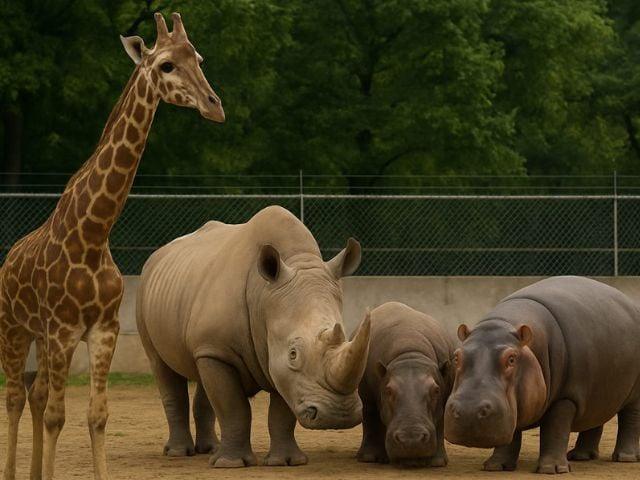The Punjab fauna department faces another obstacle in its animal import plans, because the quarantine animal service has retained the authorization to import giraffes, rhinos and hippopotamia from South Africa.
The ambitious initiative aimed at calling on large exotic animals for the Lahore zoo and the Safari park has now been delayed indefinitely, following a similar suspension of the elephant import project.
Punjab fauna managers, however, keep hope that the situation will soon be resolved, allowing the arrival of animals within the framework of the Lahore zoological installations during.
Several birds and animals have already been purchased at the national and international level for the Lahore zoo and the Safari Parc.
However, the import of major species – including 12 giraffes (nine for the safari and three for the zoo), three rhinos (one for the zoo and a pair for the safari) and a male hippopotamus for the zoo – was delayed.
According to Mudassar Hassan, director of the renovation project, while the Federal Ministry of Climate Change has issued a certificate of non-objection (NOC) for the importation of several species, including giraffes, rhinos, hippopotams, nyala antsopes and zebras concerning the risk of elephants of the disease.
Managers of the quarantine animal department have told Express News that health certificates for animals imported from South Africa were currently being examined to ensure compliance with regulations on imports from Pakistan.
“If existing health certificates do not comply with the required standards, we will request an additional verification of importers,” said an official. “This is a purely procedural question, intended to guarantee that no foreign disease enters the country.”
The ministry is particularly cautious about the presence of the virus of foot and mouth diseases (FMD) in several African countries, including South Africa. Although this tension is not currently present in Pakistan, those responsible fear that its introduction will seriously threaten the local cattle industry.
Sources confirm that a temporary ban has been placed on the importation of giraffes, rhinos, hippopotams and other large animals in South Africa as a precaution due to the risk of FMD.
The quarantine department has advised Punjab fauna to explore other countries for animal supply, preferably those without FMD viruses.
However, Mudassar Hassan stressed that this suggestion is difficult to implement. “These species are not available in other countries or are not surplus,” he said. “In addition, only South Africa has the infrastructure of freight aircraft necessary to transport such large animals.”
He added that the fauna department proposed a quarantine plan under which animals will undergo a forty initial in South Africa, followed by another quarantine period of 15 to 30 days upon arrival in Pakistan.
“In addition, the specific strain of the Cité FMD virus has never been reported in rhinos or hippopotams,” he said. “It is also important to note that these animals will be hosted in zoos and safari parks, not near the cattle.”
While the Punjab fauna positions and the quarantine department of animals differ, the Pakistan representative of WWF, Dr. Uzma Khan stressed another important problem – the source of animals. “We have to import animals from zoos, not directly in nature,” she said. “It is difficult to confirm whether imported animals are caught by nature or capture, especially in African countries.”
Dr. Khan highlighted the importance of following legal and ethical protocols. “It is better to get animals from zoos, safari parks or breeding farms certified in countries without FMD, because these animals adapt better to captivity,” she said. “On the other hand, animals caught by the savage often suffer from stress and illness when confined.”
Another critical concern is the budgetary calendar. If animals are not imported during the current financial year, the funds allocated to the project will be under public finance regulation.
However, Mudassar Hassan project director remains optimistic that imports take place over time. “Discussions are underway to extend the importance date,” he said. “I cannot yet say something definitive, but we expect to provide the public very soon.”
Launched in 2023 under the government’s government, the Lahore and Safari zoo renovation project was allocated near Rs. 5 billion.
The success of animal imports is considered a crucial step in the progress of the project.




